Citizenship in India: Understanding the Tenets and Issues
VerifiedAdded on 2023/04/21
|8
|2380
|214
AI Summary
This study explores the principles and types of citizenship in India, including jus sanguinis and jus soli. It discusses the recent controversial issues related to citizenship bills and highlights the constitutional rights and duties of Indian citizens. The study also addresses the challenges faced by the democratic welfare state.
Contribute Materials
Your contribution can guide someone’s learning journey. Share your
documents today.
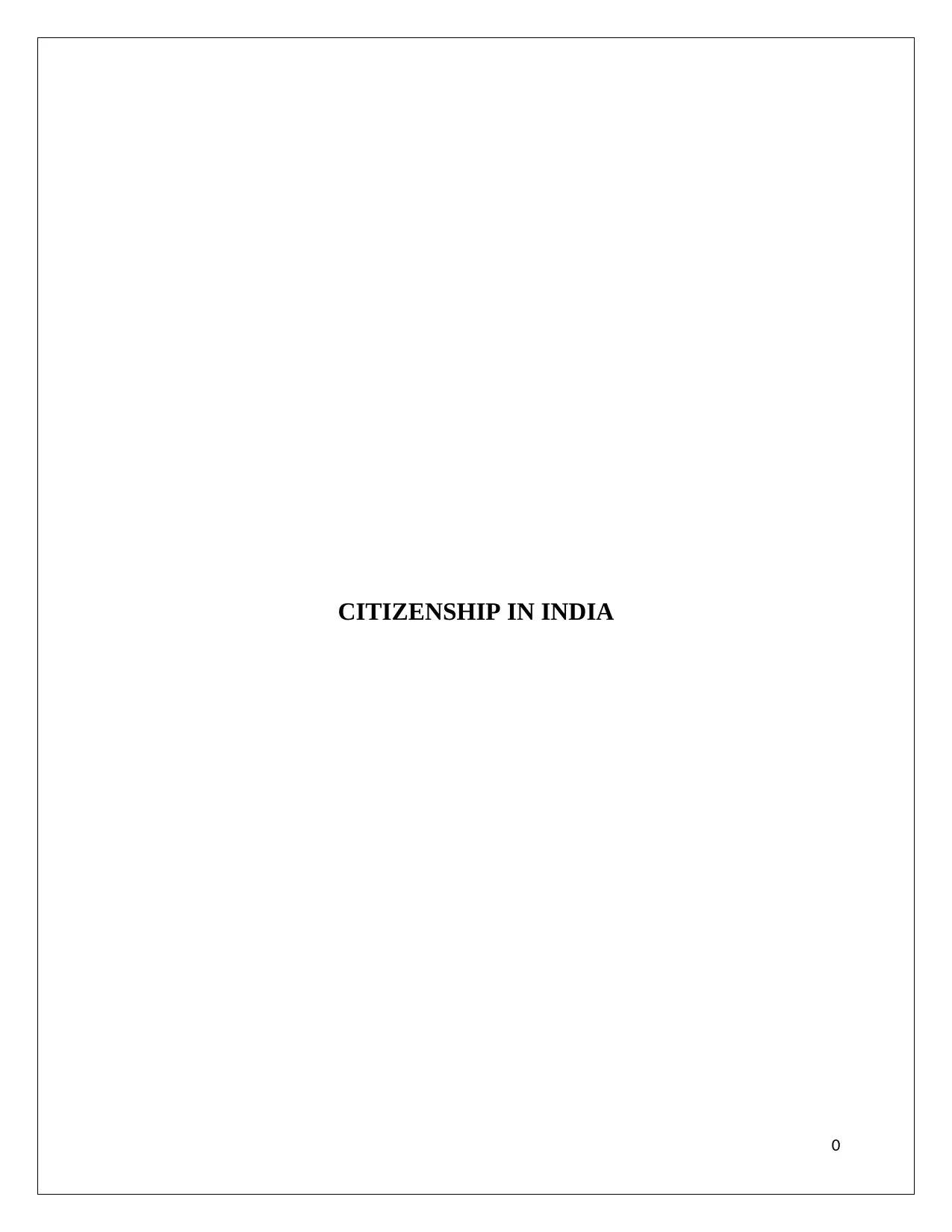
CITIZENSHIP IN INDIA
0
0
Secure Best Marks with AI Grader
Need help grading? Try our AI Grader for instant feedback on your assignments.
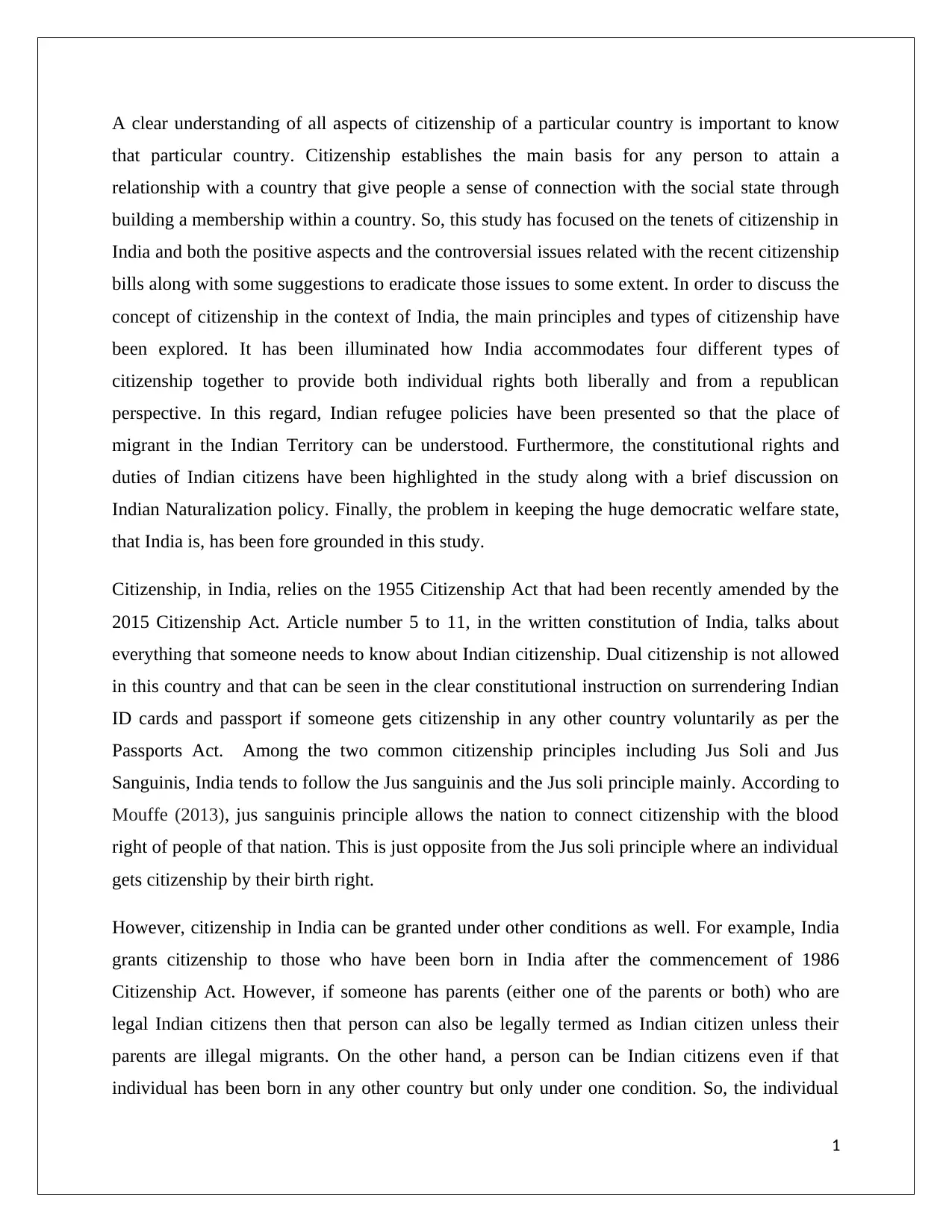
A clear understanding of all aspects of citizenship of a particular country is important to know
that particular country. Citizenship establishes the main basis for any person to attain a
relationship with a country that give people a sense of connection with the social state through
building a membership within a country. So, this study has focused on the tenets of citizenship in
India and both the positive aspects and the controversial issues related with the recent citizenship
bills along with some suggestions to eradicate those issues to some extent. In order to discuss the
concept of citizenship in the context of India, the main principles and types of citizenship have
been explored. It has been illuminated how India accommodates four different types of
citizenship together to provide both individual rights both liberally and from a republican
perspective. In this regard, Indian refugee policies have been presented so that the place of
migrant in the Indian Territory can be understood. Furthermore, the constitutional rights and
duties of Indian citizens have been highlighted in the study along with a brief discussion on
Indian Naturalization policy. Finally, the problem in keeping the huge democratic welfare state,
that India is, has been fore grounded in this study.
Citizenship, in India, relies on the 1955 Citizenship Act that had been recently amended by the
2015 Citizenship Act. Article number 5 to 11, in the written constitution of India, talks about
everything that someone needs to know about Indian citizenship. Dual citizenship is not allowed
in this country and that can be seen in the clear constitutional instruction on surrendering Indian
ID cards and passport if someone gets citizenship in any other country voluntarily as per the
Passports Act. Among the two common citizenship principles including Jus Soli and Jus
Sanguinis, India tends to follow the Jus sanguinis and the Jus soli principle mainly. According to
Mouffe (2013), jus sanguinis principle allows the nation to connect citizenship with the blood
right of people of that nation. This is just opposite from the Jus soli principle where an individual
gets citizenship by their birth right.
However, citizenship in India can be granted under other conditions as well. For example, India
grants citizenship to those who have been born in India after the commencement of 1986
Citizenship Act. However, if someone has parents (either one of the parents or both) who are
legal Indian citizens then that person can also be legally termed as Indian citizen unless their
parents are illegal migrants. On the other hand, a person can be Indian citizens even if that
individual has been born in any other country but only under one condition. So, the individual
1
that particular country. Citizenship establishes the main basis for any person to attain a
relationship with a country that give people a sense of connection with the social state through
building a membership within a country. So, this study has focused on the tenets of citizenship in
India and both the positive aspects and the controversial issues related with the recent citizenship
bills along with some suggestions to eradicate those issues to some extent. In order to discuss the
concept of citizenship in the context of India, the main principles and types of citizenship have
been explored. It has been illuminated how India accommodates four different types of
citizenship together to provide both individual rights both liberally and from a republican
perspective. In this regard, Indian refugee policies have been presented so that the place of
migrant in the Indian Territory can be understood. Furthermore, the constitutional rights and
duties of Indian citizens have been highlighted in the study along with a brief discussion on
Indian Naturalization policy. Finally, the problem in keeping the huge democratic welfare state,
that India is, has been fore grounded in this study.
Citizenship, in India, relies on the 1955 Citizenship Act that had been recently amended by the
2015 Citizenship Act. Article number 5 to 11, in the written constitution of India, talks about
everything that someone needs to know about Indian citizenship. Dual citizenship is not allowed
in this country and that can be seen in the clear constitutional instruction on surrendering Indian
ID cards and passport if someone gets citizenship in any other country voluntarily as per the
Passports Act. Among the two common citizenship principles including Jus Soli and Jus
Sanguinis, India tends to follow the Jus sanguinis and the Jus soli principle mainly. According to
Mouffe (2013), jus sanguinis principle allows the nation to connect citizenship with the blood
right of people of that nation. This is just opposite from the Jus soli principle where an individual
gets citizenship by their birth right.
However, citizenship in India can be granted under other conditions as well. For example, India
grants citizenship to those who have been born in India after the commencement of 1986
Citizenship Act. However, if someone has parents (either one of the parents or both) who are
legal Indian citizens then that person can also be legally termed as Indian citizen unless their
parents are illegal migrants. On the other hand, a person can be Indian citizens even if that
individual has been born in any other country but only under one condition. So, the individual
1
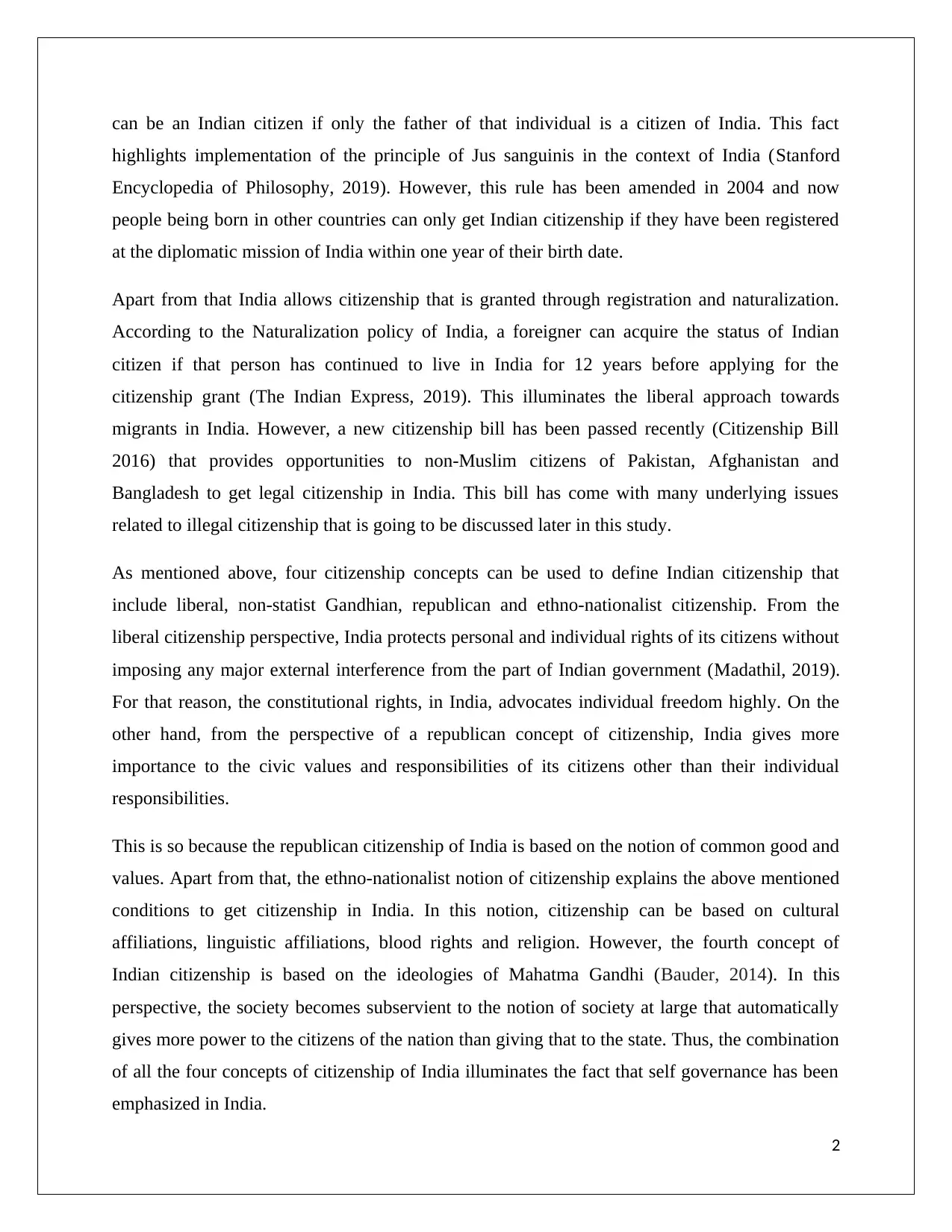
can be an Indian citizen if only the father of that individual is a citizen of India. This fact
highlights implementation of the principle of Jus sanguinis in the context of India (Stanford
Encyclopedia of Philosophy, 2019). However, this rule has been amended in 2004 and now
people being born in other countries can only get Indian citizenship if they have been registered
at the diplomatic mission of India within one year of their birth date.
Apart from that India allows citizenship that is granted through registration and naturalization.
According to the Naturalization policy of India, a foreigner can acquire the status of Indian
citizen if that person has continued to live in India for 12 years before applying for the
citizenship grant (The Indian Express, 2019). This illuminates the liberal approach towards
migrants in India. However, a new citizenship bill has been passed recently (Citizenship Bill
2016) that provides opportunities to non-Muslim citizens of Pakistan, Afghanistan and
Bangladesh to get legal citizenship in India. This bill has come with many underlying issues
related to illegal citizenship that is going to be discussed later in this study.
As mentioned above, four citizenship concepts can be used to define Indian citizenship that
include liberal, non-statist Gandhian, republican and ethno-nationalist citizenship. From the
liberal citizenship perspective, India protects personal and individual rights of its citizens without
imposing any major external interference from the part of Indian government (Madathil, 2019).
For that reason, the constitutional rights, in India, advocates individual freedom highly. On the
other hand, from the perspective of a republican concept of citizenship, India gives more
importance to the civic values and responsibilities of its citizens other than their individual
responsibilities.
This is so because the republican citizenship of India is based on the notion of common good and
values. Apart from that, the ethno-nationalist notion of citizenship explains the above mentioned
conditions to get citizenship in India. In this notion, citizenship can be based on cultural
affiliations, linguistic affiliations, blood rights and religion. However, the fourth concept of
Indian citizenship is based on the ideologies of Mahatma Gandhi (Bauder, 2014). In this
perspective, the society becomes subservient to the notion of society at large that automatically
gives more power to the citizens of the nation than giving that to the state. Thus, the combination
of all the four concepts of citizenship of India illuminates the fact that self governance has been
emphasized in India.
2
highlights implementation of the principle of Jus sanguinis in the context of India (Stanford
Encyclopedia of Philosophy, 2019). However, this rule has been amended in 2004 and now
people being born in other countries can only get Indian citizenship if they have been registered
at the diplomatic mission of India within one year of their birth date.
Apart from that India allows citizenship that is granted through registration and naturalization.
According to the Naturalization policy of India, a foreigner can acquire the status of Indian
citizen if that person has continued to live in India for 12 years before applying for the
citizenship grant (The Indian Express, 2019). This illuminates the liberal approach towards
migrants in India. However, a new citizenship bill has been passed recently (Citizenship Bill
2016) that provides opportunities to non-Muslim citizens of Pakistan, Afghanistan and
Bangladesh to get legal citizenship in India. This bill has come with many underlying issues
related to illegal citizenship that is going to be discussed later in this study.
As mentioned above, four citizenship concepts can be used to define Indian citizenship that
include liberal, non-statist Gandhian, republican and ethno-nationalist citizenship. From the
liberal citizenship perspective, India protects personal and individual rights of its citizens without
imposing any major external interference from the part of Indian government (Madathil, 2019).
For that reason, the constitutional rights, in India, advocates individual freedom highly. On the
other hand, from the perspective of a republican concept of citizenship, India gives more
importance to the civic values and responsibilities of its citizens other than their individual
responsibilities.
This is so because the republican citizenship of India is based on the notion of common good and
values. Apart from that, the ethno-nationalist notion of citizenship explains the above mentioned
conditions to get citizenship in India. In this notion, citizenship can be based on cultural
affiliations, linguistic affiliations, blood rights and religion. However, the fourth concept of
Indian citizenship is based on the ideologies of Mahatma Gandhi (Bauder, 2014). In this
perspective, the society becomes subservient to the notion of society at large that automatically
gives more power to the citizens of the nation than giving that to the state. Thus, the combination
of all the four concepts of citizenship of India illuminates the fact that self governance has been
emphasized in India.
2
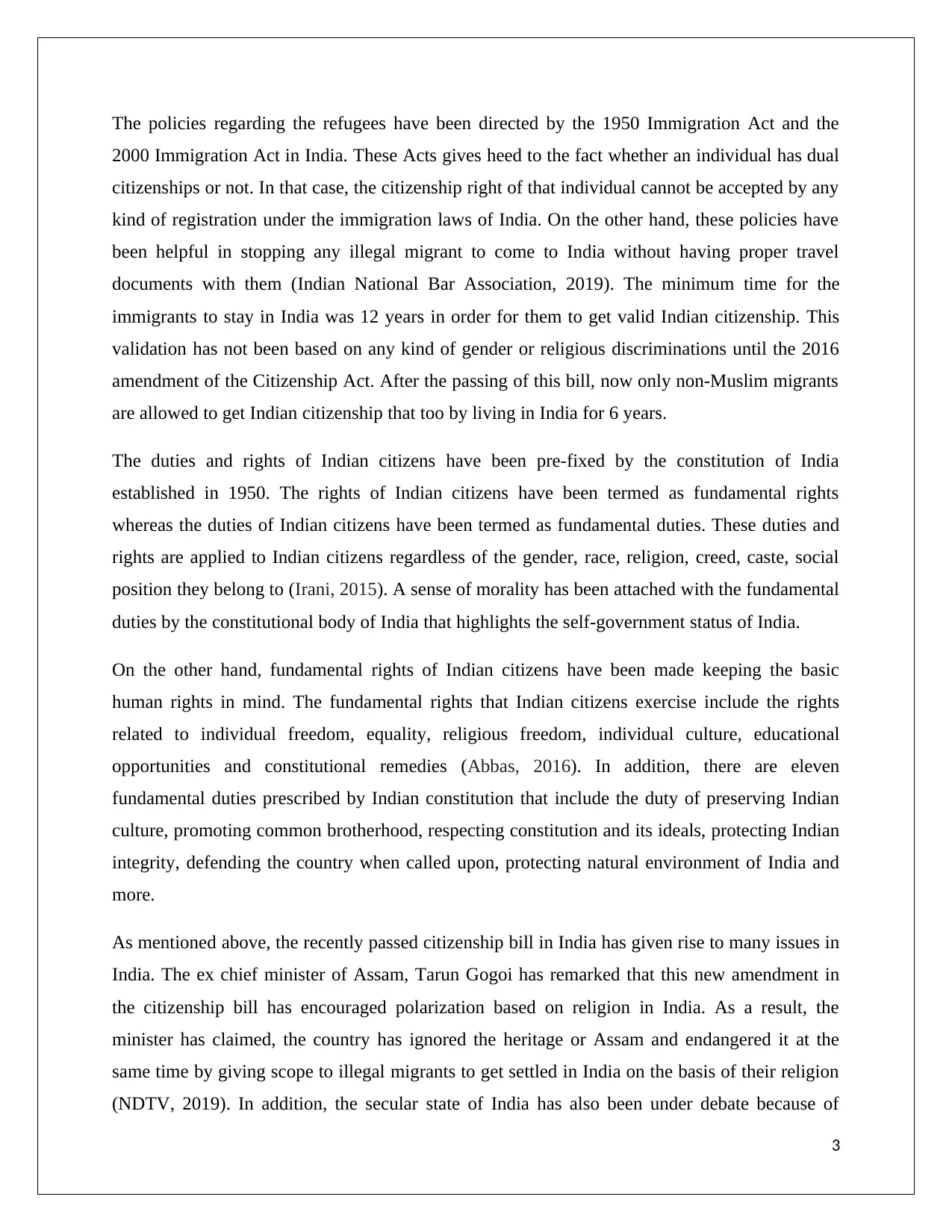
The policies regarding the refugees have been directed by the 1950 Immigration Act and the
2000 Immigration Act in India. These Acts gives heed to the fact whether an individual has dual
citizenships or not. In that case, the citizenship right of that individual cannot be accepted by any
kind of registration under the immigration laws of India. On the other hand, these policies have
been helpful in stopping any illegal migrant to come to India without having proper travel
documents with them (Indian National Bar Association, 2019). The minimum time for the
immigrants to stay in India was 12 years in order for them to get valid Indian citizenship. This
validation has not been based on any kind of gender or religious discriminations until the 2016
amendment of the Citizenship Act. After the passing of this bill, now only non-Muslim migrants
are allowed to get Indian citizenship that too by living in India for 6 years.
The duties and rights of Indian citizens have been pre-fixed by the constitution of India
established in 1950. The rights of Indian citizens have been termed as fundamental rights
whereas the duties of Indian citizens have been termed as fundamental duties. These duties and
rights are applied to Indian citizens regardless of the gender, race, religion, creed, caste, social
position they belong to (Irani, 2015). A sense of morality has been attached with the fundamental
duties by the constitutional body of India that highlights the self-government status of India.
On the other hand, fundamental rights of Indian citizens have been made keeping the basic
human rights in mind. The fundamental rights that Indian citizens exercise include the rights
related to individual freedom, equality, religious freedom, individual culture, educational
opportunities and constitutional remedies (Abbas, 2016). In addition, there are eleven
fundamental duties prescribed by Indian constitution that include the duty of preserving Indian
culture, promoting common brotherhood, respecting constitution and its ideals, protecting Indian
integrity, defending the country when called upon, protecting natural environment of India and
more.
As mentioned above, the recently passed citizenship bill in India has given rise to many issues in
India. The ex chief minister of Assam, Tarun Gogoi has remarked that this new amendment in
the citizenship bill has encouraged polarization based on religion in India. As a result, the
minister has claimed, the country has ignored the heritage or Assam and endangered it at the
same time by giving scope to illegal migrants to get settled in India on the basis of their religion
(NDTV, 2019). In addition, the secular state of India has also been under debate because of
3
2000 Immigration Act in India. These Acts gives heed to the fact whether an individual has dual
citizenships or not. In that case, the citizenship right of that individual cannot be accepted by any
kind of registration under the immigration laws of India. On the other hand, these policies have
been helpful in stopping any illegal migrant to come to India without having proper travel
documents with them (Indian National Bar Association, 2019). The minimum time for the
immigrants to stay in India was 12 years in order for them to get valid Indian citizenship. This
validation has not been based on any kind of gender or religious discriminations until the 2016
amendment of the Citizenship Act. After the passing of this bill, now only non-Muslim migrants
are allowed to get Indian citizenship that too by living in India for 6 years.
The duties and rights of Indian citizens have been pre-fixed by the constitution of India
established in 1950. The rights of Indian citizens have been termed as fundamental rights
whereas the duties of Indian citizens have been termed as fundamental duties. These duties and
rights are applied to Indian citizens regardless of the gender, race, religion, creed, caste, social
position they belong to (Irani, 2015). A sense of morality has been attached with the fundamental
duties by the constitutional body of India that highlights the self-government status of India.
On the other hand, fundamental rights of Indian citizens have been made keeping the basic
human rights in mind. The fundamental rights that Indian citizens exercise include the rights
related to individual freedom, equality, religious freedom, individual culture, educational
opportunities and constitutional remedies (Abbas, 2016). In addition, there are eleven
fundamental duties prescribed by Indian constitution that include the duty of preserving Indian
culture, promoting common brotherhood, respecting constitution and its ideals, protecting Indian
integrity, defending the country when called upon, protecting natural environment of India and
more.
As mentioned above, the recently passed citizenship bill in India has given rise to many issues in
India. The ex chief minister of Assam, Tarun Gogoi has remarked that this new amendment in
the citizenship bill has encouraged polarization based on religion in India. As a result, the
minister has claimed, the country has ignored the heritage or Assam and endangered it at the
same time by giving scope to illegal migrants to get settled in India on the basis of their religion
(NDTV, 2019). In addition, the secular state of India has also been under debate because of
3
Secure Best Marks with AI Grader
Need help grading? Try our AI Grader for instant feedback on your assignments.
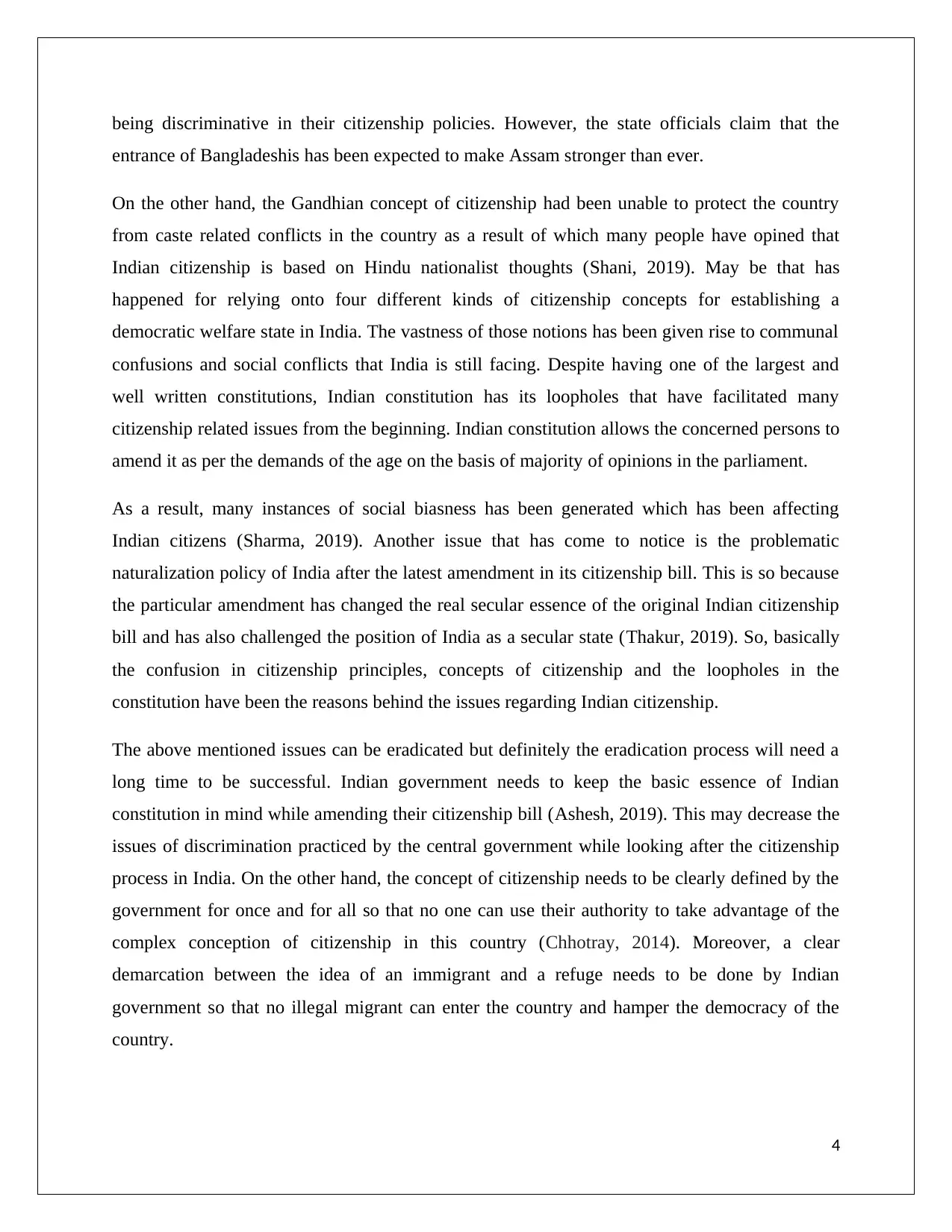
being discriminative in their citizenship policies. However, the state officials claim that the
entrance of Bangladeshis has been expected to make Assam stronger than ever.
On the other hand, the Gandhian concept of citizenship had been unable to protect the country
from caste related conflicts in the country as a result of which many people have opined that
Indian citizenship is based on Hindu nationalist thoughts (Shani, 2019). May be that has
happened for relying onto four different kinds of citizenship concepts for establishing a
democratic welfare state in India. The vastness of those notions has been given rise to communal
confusions and social conflicts that India is still facing. Despite having one of the largest and
well written constitutions, Indian constitution has its loopholes that have facilitated many
citizenship related issues from the beginning. Indian constitution allows the concerned persons to
amend it as per the demands of the age on the basis of majority of opinions in the parliament.
As a result, many instances of social biasness has been generated which has been affecting
Indian citizens (Sharma, 2019). Another issue that has come to notice is the problematic
naturalization policy of India after the latest amendment in its citizenship bill. This is so because
the particular amendment has changed the real secular essence of the original Indian citizenship
bill and has also challenged the position of India as a secular state (Thakur, 2019). So, basically
the confusion in citizenship principles, concepts of citizenship and the loopholes in the
constitution have been the reasons behind the issues regarding Indian citizenship.
The above mentioned issues can be eradicated but definitely the eradication process will need a
long time to be successful. Indian government needs to keep the basic essence of Indian
constitution in mind while amending their citizenship bill (Ashesh, 2019). This may decrease the
issues of discrimination practiced by the central government while looking after the citizenship
process in India. On the other hand, the concept of citizenship needs to be clearly defined by the
government for once and for all so that no one can use their authority to take advantage of the
complex conception of citizenship in this country (Chhotray, 2014). Moreover, a clear
demarcation between the idea of an immigrant and a refuge needs to be done by Indian
government so that no illegal migrant can enter the country and hamper the democracy of the
country.
4
entrance of Bangladeshis has been expected to make Assam stronger than ever.
On the other hand, the Gandhian concept of citizenship had been unable to protect the country
from caste related conflicts in the country as a result of which many people have opined that
Indian citizenship is based on Hindu nationalist thoughts (Shani, 2019). May be that has
happened for relying onto four different kinds of citizenship concepts for establishing a
democratic welfare state in India. The vastness of those notions has been given rise to communal
confusions and social conflicts that India is still facing. Despite having one of the largest and
well written constitutions, Indian constitution has its loopholes that have facilitated many
citizenship related issues from the beginning. Indian constitution allows the concerned persons to
amend it as per the demands of the age on the basis of majority of opinions in the parliament.
As a result, many instances of social biasness has been generated which has been affecting
Indian citizens (Sharma, 2019). Another issue that has come to notice is the problematic
naturalization policy of India after the latest amendment in its citizenship bill. This is so because
the particular amendment has changed the real secular essence of the original Indian citizenship
bill and has also challenged the position of India as a secular state (Thakur, 2019). So, basically
the confusion in citizenship principles, concepts of citizenship and the loopholes in the
constitution have been the reasons behind the issues regarding Indian citizenship.
The above mentioned issues can be eradicated but definitely the eradication process will need a
long time to be successful. Indian government needs to keep the basic essence of Indian
constitution in mind while amending their citizenship bill (Ashesh, 2019). This may decrease the
issues of discrimination practiced by the central government while looking after the citizenship
process in India. On the other hand, the concept of citizenship needs to be clearly defined by the
government for once and for all so that no one can use their authority to take advantage of the
complex conception of citizenship in this country (Chhotray, 2014). Moreover, a clear
demarcation between the idea of an immigrant and a refuge needs to be done by Indian
government so that no illegal migrant can enter the country and hamper the democracy of the
country.
4
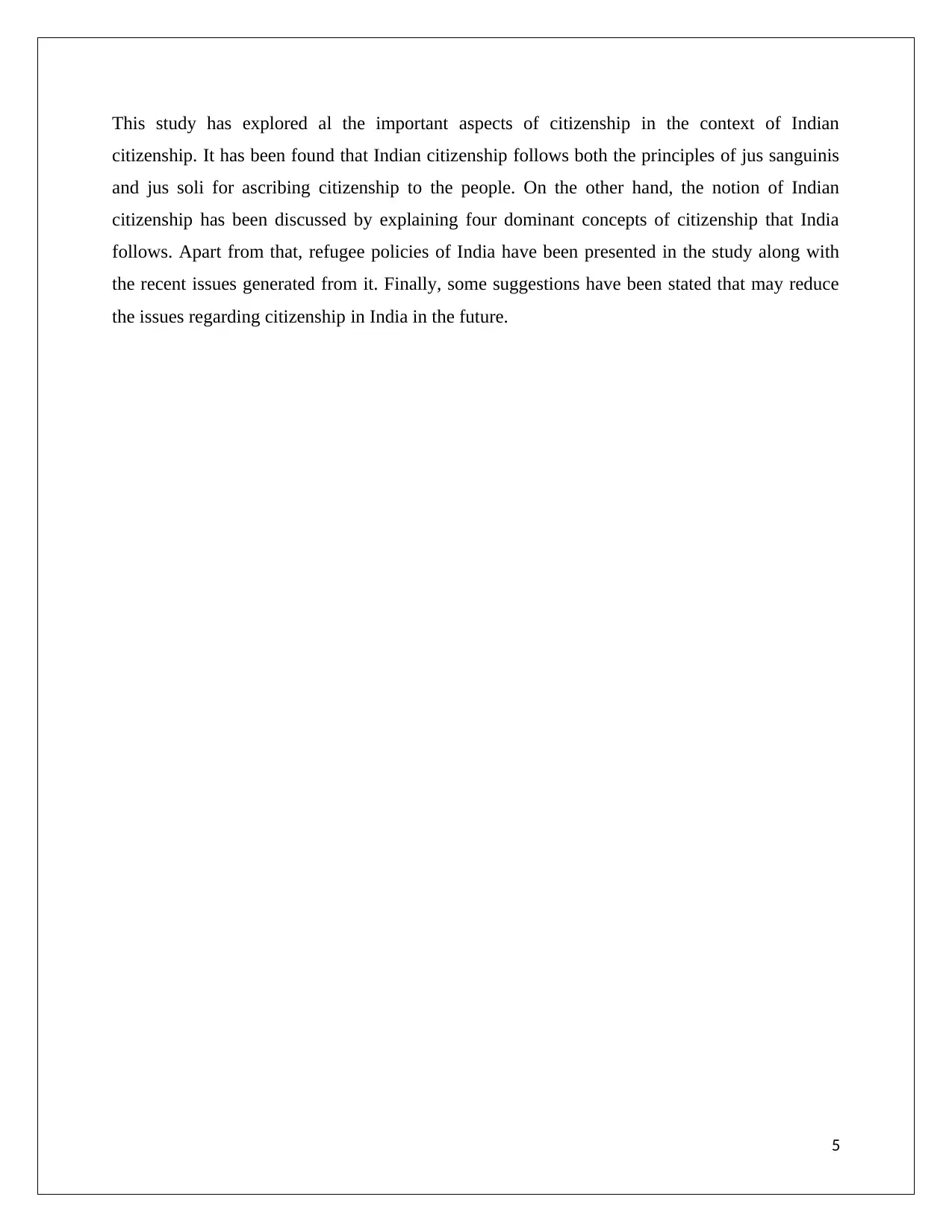
This study has explored al the important aspects of citizenship in the context of Indian
citizenship. It has been found that Indian citizenship follows both the principles of jus sanguinis
and jus soli for ascribing citizenship to the people. On the other hand, the notion of Indian
citizenship has been discussed by explaining four dominant concepts of citizenship that India
follows. Apart from that, refugee policies of India have been presented in the study along with
the recent issues generated from it. Finally, some suggestions have been stated that may reduce
the issues regarding citizenship in India in the future.
5
citizenship. It has been found that Indian citizenship follows both the principles of jus sanguinis
and jus soli for ascribing citizenship to the people. On the other hand, the notion of Indian
citizenship has been discussed by explaining four dominant concepts of citizenship that India
follows. Apart from that, refugee policies of India have been presented in the study along with
the recent issues generated from it. Finally, some suggestions have been stated that may reduce
the issues regarding citizenship in India in the future.
5
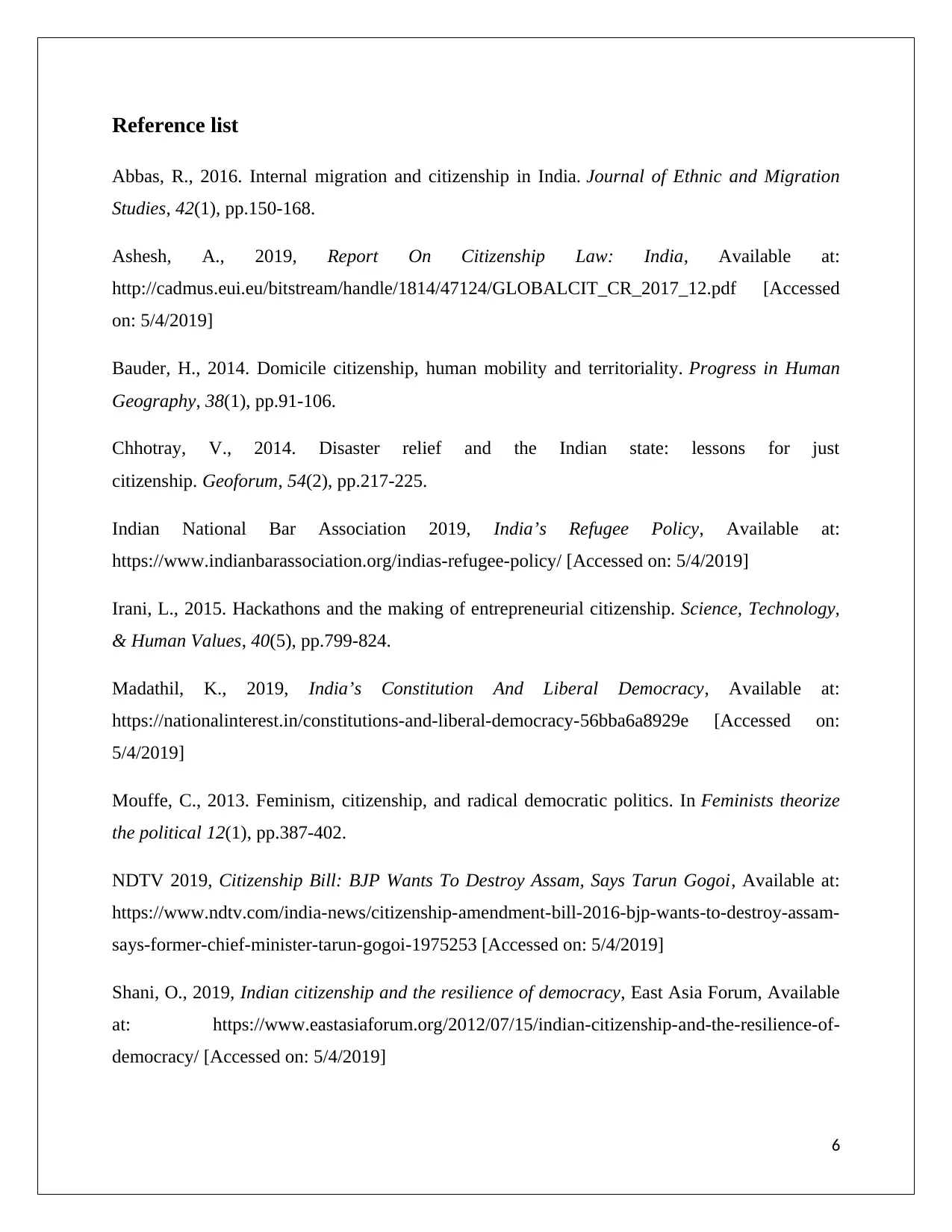
Reference list
Abbas, R., 2016. Internal migration and citizenship in India. Journal of Ethnic and Migration
Studies, 42(1), pp.150-168.
Ashesh, A., 2019, Report On Citizenship Law: India, Available at:
http://cadmus.eui.eu/bitstream/handle/1814/47124/GLOBALCIT_CR_2017_12.pdf [Accessed
on: 5/4/2019]
Bauder, H., 2014. Domicile citizenship, human mobility and territoriality. Progress in Human
Geography, 38(1), pp.91-106.
Chhotray, V., 2014. Disaster relief and the Indian state: lessons for just
citizenship. Geoforum, 54(2), pp.217-225.
Indian National Bar Association 2019, India’s Refugee Policy, Available at:
https://www.indianbarassociation.org/indias-refugee-policy/ [Accessed on: 5/4/2019]
Irani, L., 2015. Hackathons and the making of entrepreneurial citizenship. Science, Technology,
& Human Values, 40(5), pp.799-824.
Madathil, K., 2019, India’s Constitution And Liberal Democracy, Available at:
https://nationalinterest.in/constitutions-and-liberal-democracy-56bba6a8929e [Accessed on:
5/4/2019]
Mouffe, C., 2013. Feminism, citizenship, and radical democratic politics. In Feminists theorize
the political 12(1), pp.387-402.
NDTV 2019, Citizenship Bill: BJP Wants To Destroy Assam, Says Tarun Gogoi, Available at:
https://www.ndtv.com/india-news/citizenship-amendment-bill-2016-bjp-wants-to-destroy-assam-
says-former-chief-minister-tarun-gogoi-1975253 [Accessed on: 5/4/2019]
Shani, O., 2019, Indian citizenship and the resilience of democracy, East Asia Forum, Available
at: https://www.eastasiaforum.org/2012/07/15/indian-citizenship-and-the-resilience-of-
democracy/ [Accessed on: 5/4/2019]
6
Abbas, R., 2016. Internal migration and citizenship in India. Journal of Ethnic and Migration
Studies, 42(1), pp.150-168.
Ashesh, A., 2019, Report On Citizenship Law: India, Available at:
http://cadmus.eui.eu/bitstream/handle/1814/47124/GLOBALCIT_CR_2017_12.pdf [Accessed
on: 5/4/2019]
Bauder, H., 2014. Domicile citizenship, human mobility and territoriality. Progress in Human
Geography, 38(1), pp.91-106.
Chhotray, V., 2014. Disaster relief and the Indian state: lessons for just
citizenship. Geoforum, 54(2), pp.217-225.
Indian National Bar Association 2019, India’s Refugee Policy, Available at:
https://www.indianbarassociation.org/indias-refugee-policy/ [Accessed on: 5/4/2019]
Irani, L., 2015. Hackathons and the making of entrepreneurial citizenship. Science, Technology,
& Human Values, 40(5), pp.799-824.
Madathil, K., 2019, India’s Constitution And Liberal Democracy, Available at:
https://nationalinterest.in/constitutions-and-liberal-democracy-56bba6a8929e [Accessed on:
5/4/2019]
Mouffe, C., 2013. Feminism, citizenship, and radical democratic politics. In Feminists theorize
the political 12(1), pp.387-402.
NDTV 2019, Citizenship Bill: BJP Wants To Destroy Assam, Says Tarun Gogoi, Available at:
https://www.ndtv.com/india-news/citizenship-amendment-bill-2016-bjp-wants-to-destroy-assam-
says-former-chief-minister-tarun-gogoi-1975253 [Accessed on: 5/4/2019]
Shani, O., 2019, Indian citizenship and the resilience of democracy, East Asia Forum, Available
at: https://www.eastasiaforum.org/2012/07/15/indian-citizenship-and-the-resilience-of-
democracy/ [Accessed on: 5/4/2019]
6
Paraphrase This Document
Need a fresh take? Get an instant paraphrase of this document with our AI Paraphraser
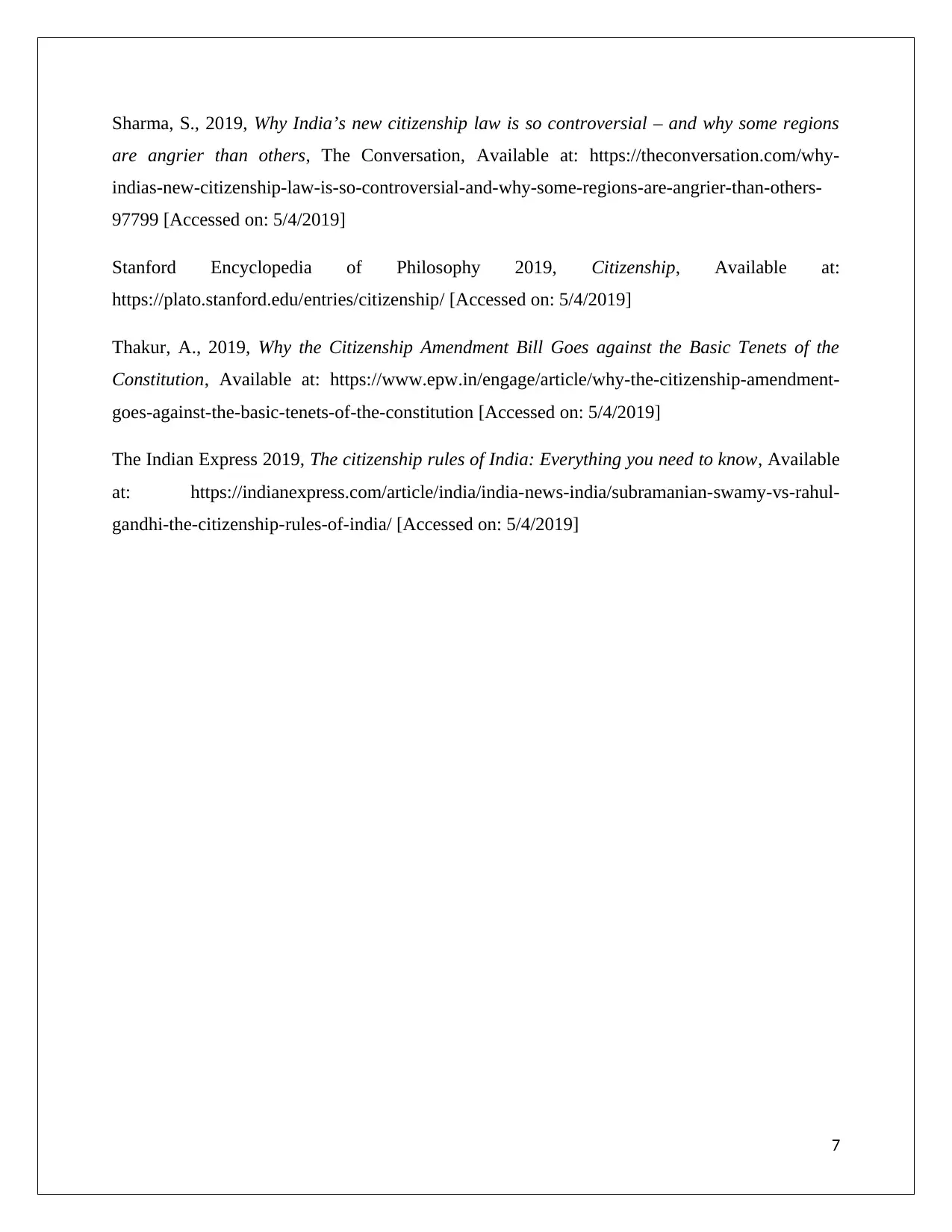
Sharma, S., 2019, Why India’s new citizenship law is so controversial – and why some regions
are angrier than others, The Conversation, Available at: https://theconversation.com/why-
indias-new-citizenship-law-is-so-controversial-and-why-some-regions-are-angrier-than-others-
97799 [Accessed on: 5/4/2019]
Stanford Encyclopedia of Philosophy 2019, Citizenship, Available at:
https://plato.stanford.edu/entries/citizenship/ [Accessed on: 5/4/2019]
Thakur, A., 2019, Why the Citizenship Amendment Bill Goes against the Basic Tenets of the
Constitution, Available at: https://www.epw.in/engage/article/why-the-citizenship-amendment-
goes-against-the-basic-tenets-of-the-constitution [Accessed on: 5/4/2019]
The Indian Express 2019, The citizenship rules of India: Everything you need to know, Available
at: https://indianexpress.com/article/india/india-news-india/subramanian-swamy-vs-rahul-
gandhi-the-citizenship-rules-of-india/ [Accessed on: 5/4/2019]
7
are angrier than others, The Conversation, Available at: https://theconversation.com/why-
indias-new-citizenship-law-is-so-controversial-and-why-some-regions-are-angrier-than-others-
97799 [Accessed on: 5/4/2019]
Stanford Encyclopedia of Philosophy 2019, Citizenship, Available at:
https://plato.stanford.edu/entries/citizenship/ [Accessed on: 5/4/2019]
Thakur, A., 2019, Why the Citizenship Amendment Bill Goes against the Basic Tenets of the
Constitution, Available at: https://www.epw.in/engage/article/why-the-citizenship-amendment-
goes-against-the-basic-tenets-of-the-constitution [Accessed on: 5/4/2019]
The Indian Express 2019, The citizenship rules of India: Everything you need to know, Available
at: https://indianexpress.com/article/india/india-news-india/subramanian-swamy-vs-rahul-
gandhi-the-citizenship-rules-of-india/ [Accessed on: 5/4/2019]
7
1 out of 8
Related Documents
Your All-in-One AI-Powered Toolkit for Academic Success.
+13062052269
info@desklib.com
Available 24*7 on WhatsApp / Email
![[object Object]](/_next/static/media/star-bottom.7253800d.svg)
Unlock your academic potential
© 2024 | Zucol Services PVT LTD | All rights reserved.





